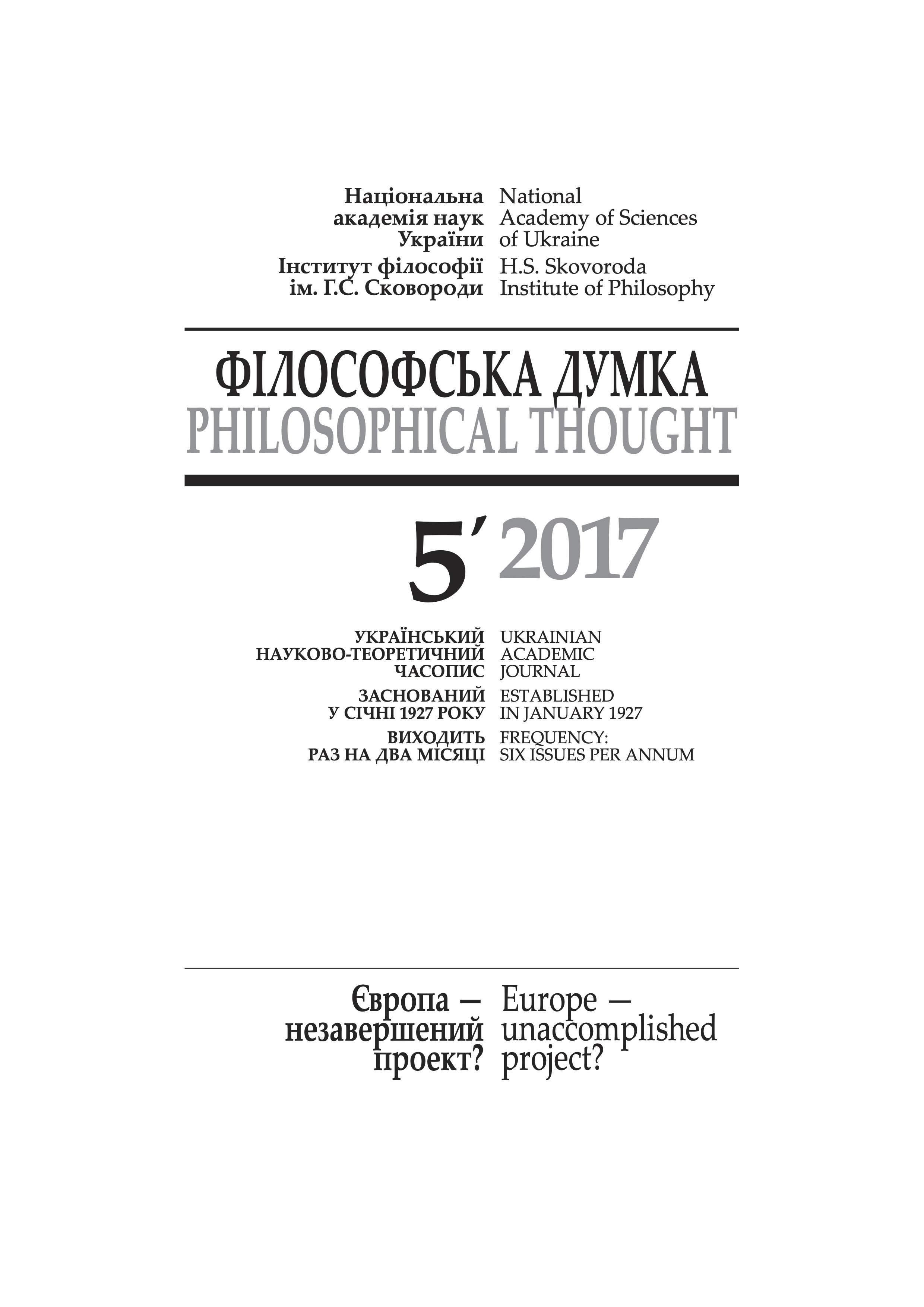On the Phenomenology of Natural Science
Keywords:
phenomenology, natural science, naturalism, materialism, phenomenological constitution, mathematical construction, Edmund Husserl, Oskar BeckerAbstract
An attempt of Oscar Becker, an Edmund Husserl’s student and mathematician, of the phenomenological substantiation of the classical and non-classical (Einsteinian) physics and physical applications of geometry is the focus of interest of this article. Becker carried through his attempt basing on Husserl’s thorough analysis of the phenomenological constitution of material nature (published in Ideen II), as well as his general method of phenomenological clarification of scientific concepts and statements (set forth in Ideen III), which are also examined by the author of the article. The article purpose is to demonstrate how the implicit statements of the fundamental nature constitute a part of the system of knowledge in natural sciences and how these statements are subject to phenomenological clarification.
References
Becker, O. (1923). Beiträge zur phänomenologischen Begründung der Geometrie und ihrer physikalischen Anwendungen. Jahrbuch für Philosophie und phänomenologische Forschung, VI. Band, S. 385—561.
Gallagher, S., Zahavi, D. (2008). Phenomenological Mind. An Introduction to Phenomenology and the Cognitive Science. New York, London, Ontario: Routledge.
Husserl E. (1952). Ideen zu einer reinen Phänomenologie und phänomenologischen Philosophie. Zweites Buch: Phänomenologische Untersuchungen zur Konstitution. (M. Biemel, Hrsg.) Den Haag: Martinus Nijhoff.
Husserl, E. (1973a). Cartesianische Meditationen und Pariser Vorträge. (S. Strasser, Hrsg.) Den Haag: Martinus Nijhoff.
Husserl, E. (1973b). Ding und Raum. Vorlesungen 1907. (U. Claesges, Hrsg.) Den Haag: Martinus Nijhoff.
Husserl, E. (1976a). Die Krisis der europäischen Wissenschaften und die transzendentale Phä nomenologie. Eine Einleitung in die Phänomenologische Philosophie (2. Auflage Ausg.). (W. Biemel, Hrsg.) Den Haag: Martinus Nijhoff.
https://doi.org/10.1007/978-94-010-1335-2
Husserl, E. (1976b). Die Krisis des europäischen Menschentums und die Philosophie. In E. Husserl, & W. Biemel (Hrsg.), Die Krisis der europäischen Wissenschaften und die transzendentale Phänomenologie. Eine Einleitung in die phänomenologische Philosophie (2. Auflage Ausg., S. 314-349). Den Haag: Martinus Nijhoff.
Husserl, E. (1976c). Ideen zu einer reinen Phänomenologie und phänomenologischen Philosophie. Erstes Buch: Allgemeine Einführung in die reine Phänomenologie. (K. Schuhmann, Hrsg.) Den Haag: Martinus Nijhoff.
Husserl, E. (1986). Ideen zu einer reinen Phänomenologie und phänomenologischen Philosophie. Drittes Buch: Die Phänomenologie und die Fundamente der. (K.-H.Lembeck, Hrsg.) Hamburg: Felix Meiner Verlag
Husserl, E. (2013). Ideen zu einer reinen Phänomenologie und phänomenologischen Philosophie. Zweites Buch: Phänomenologische Untersuchungen zur Konstitution und Wissenschaftstheorie. Die drei Urtexte mit ergänzenden Texten (1908—1924). Dordrecht u.a.
Kockelmans, J. J., Kisiel, T. J. (1970). Oskar Becker. In J. Kockelmans (Ed.), Phenomenology and the Natural Sciences (pp. 117—118). Northwestern University Press.
Kuhn, T. (1977). Objectivity, Value Judgment and Theory Choice. In T. Kuhn, The Essential Tension. Selected Studies in Scientific Tradition and Change (pp. 320—340). Chicago and London: The University of Chicago Press.
Kuhn, T. (1996). The Structure of Scientific Revolutions (3rd edition ed.). Chicago and London: The University of Chicago Press. https://doi.org/10.7208/chicago/9780226458106.001.0001
Lévinas, E. (1967). La ruine de la représentation. Dans E. Lévinas, En découvrant l'existence avec Husserl et Heidegger (pp. 127—135). Paris: Librairie Philosophique J. Vrin.
Nagel, T. (2012). Mind and Cosmos: Why the Materialist Neo-Darwinian Conception of Nature is Almost Certainly False. Oxford: Oxford University Press. https://doi.org/10.1093/acprof:oso/9780199919758.001.0001
Roy, J.-M., Petitot, J., Pachoud, B., & Varela, F. (1999). Beyond the Gap: An Introduction to Naturalizing Phenomenology. In J. Petitot, F. Varela, B. Pachoud, & J.-M. (. Roy, Naturalizing
Ströker, E. (1997). Edmund Husserl's Phenomenology as Foundation of Natural Science. In E. Ströker, The Husserlian Foundations of Science (pp. 169—186). Dordrecht, Boston, London:
Downloads
-
PDF (Українська)
Downloads: 200
Published
How to Cite
Issue
Section
License
Authors who publish with this journal agree to the following terms:
- Authors retain copyright and grant the journal right of first publication.
- Authors are able to enter into separate, additional contractual arrangements for the non-exclusive distribution of the journal's published version of the work (e.g., post it to an institutional repository or publish it in a book), with an acknowledgement of its initial publication in this journal.
- Authors are permitted and encouraged to post their work online (e.g., in institutional repositories or on their website) prior to and during the submission process, as it can lead to productive exchanges, as well as earlier and greater citation of published work (See The Effect of Open Access).


